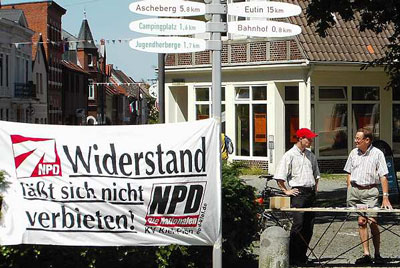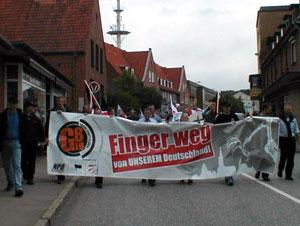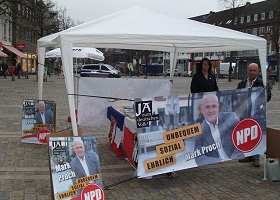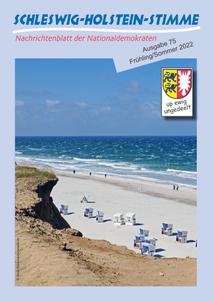Welcome to the English Homepage of the National Democratic Party of Germany - Nationaldemokratische Partei Deutschlands (NPD)
History of the National Democratic Party
History of the National Democratic Party
The National Democratic Party (Nationaldemokratische Partei Deutschlands, or NPD) is Germany's oldest nationalist party since 1945 and one of the few patriotic organizations not yet banned by the government. It was formed on November 28, 1964, by leading members of the disbanded Deutsche Reichspartei and several smaller patriotic groups. At that time the NPD was led by Adolf von Thadden, while other active members included the noted revisionist historian Udo Walendy, ex-Wehrmacht General Artur Wilhelm Schmitt, and rocket pioneer Dr. Hermann Oberth. Among those offering their early support and assistance was Britain's Nationalist leader Sir Oswald Mosley. In a letter of December 16, 1964, to leading NPD member Wolfgang Frenz, Mosley wrote enthusiastically of his hopes for the new party, stressing that it is "of the greatest importance ... to support the formation of a nationalist party for Europe".
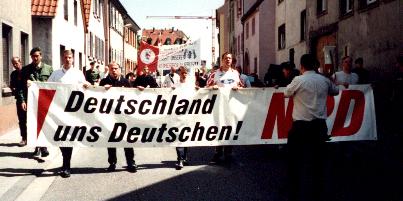 The NPD grew rapidly during the 1960's, gaining elected representatives in seven West German provincial parliaments. Initially it was held together by a common commitment to German unification and an end to occupation by foreign armies. The party lacked a radical ideology, however, and this was highlighted when it lost most of its support to established conservative politicians who adopted some of the NPD's goals during the 1970's. At the end of that decade, therefore, the then chairman, Martin Mussgnug, began a restructuring which combined the dropping of much of the early conservative political rhetoric with an emphasis on the ideological education of members. Thereafter the party began concentrating upon building a strong organizational infrastructure, rather than upon short-term electioneering. Consequently, after the partial reunification of Germany in 1990, the NPD was able to gain considerable strength in the eastern part of the country: the former German Democratic Republic. In fact, today the NPD is strongest in the eastern parts of the country.
The NPD grew rapidly during the 1960's, gaining elected representatives in seven West German provincial parliaments. Initially it was held together by a common commitment to German unification and an end to occupation by foreign armies. The party lacked a radical ideology, however, and this was highlighted when it lost most of its support to established conservative politicians who adopted some of the NPD's goals during the 1970's. At the end of that decade, therefore, the then chairman, Martin Mussgnug, began a restructuring which combined the dropping of much of the early conservative political rhetoric with an emphasis on the ideological education of members. Thereafter the party began concentrating upon building a strong organizational infrastructure, rather than upon short-term electioneering. Consequently, after the partial reunification of Germany in 1990, the NPD was able to gain considerable strength in the eastern part of the country: the former German Democratic Republic. In fact, today the NPD is strongest in the eastern parts of the country.
Under Udo Voigt, who led the party since 1996, the NPD continued to pursue a revolutionary political course and the active cooperation of serious, like-minded organizations worldwide. In September 1996 the NPD's youth organization sponsored a European Youth Congress attended by 400 German nationalists and representatives of nationalist organizations from across Europe and North America. Udo Voigt served in the German Army (Bundeswehr) and left as captain. In 1995 he became vice-chairman of the party and in 1996 was elected chairman of the NPD. In the period with Voigt considerable victories were achieved. In 2004 the NPD attained 9,2% of the electorate and won factional strength in state parliament in the southeastern State of Saxony and only two years later 7,3% in the northeastern State of Mecklenburg-Vorpommern where a second faction in a state parliament was established with Udo Pastörs as leader. This was a real shock for the system-parties in Germany. Besides these victories, the NPD also made good progress in municipal and local elections with over 21% of the votes in some districts. The fact that the NPD remained in parliament after the following state elections in Saxony 2009 and Mecklenburg-Vorpommern 2011 5 years later was a great pain to the system and a great success for the party and its´ followers. However, under Voigt party finances were not clearly administered and the fact that the federal treasurer Erwin Kemna did not work correctly and was not controlled at top level as it should have been, led to grave financial problems. Kema was charged and punished but the party had lost a degree of credibility. In the following years the German Bundestag penalized the party by withholding a great deal of allocated money, i.e. the money that was due to the NPD in course of election successes. It took a number of internal changes both personal and structural and also some time to correct the damage.
The first change was the election of Holger Apfel as the new chairman in November 2011 and in the following years the NPD stood firm, taking part in all important elections. However the System exercised more and more political pressure on the NPD and after the so called “NSU-Affair” (National-Socialist-Underground) was disclosed by government and media in the same month and year and made accountable for the murder of 9 migrants and one policewoman the calls for a ban of the NPD led to a second effort after the first one had failed in 2003 due to the involvement of the secret services. As expected, the whole NSU complex has thrown up more questions than answers and the complete failure of the police and secret services in a period of over 10 years has led to more and more disbelief. Up to the present all relevant efforts of the system and the media to construct common lines of activity between NPD and NSU have failed. Many observers and even political opponents have lost faith in German authorities and now the whole crisis is being focused out of public attention after the reports of the Thüringen State Parliament Investigation Committee in 2014 humbled all involved institutions. But still, the government supported and directed initial campaign against the NPD has caused political setbacks.
Holger Apfel resigned as chairman of the NPD and also as leader of the faction in the state parliament of Saxony at the end of December 2013 due to moral allegations against him which he did not clear.
In this difficult situation vice chairman Udo Pastörs, also leader of a state parliament faction took responsibility for the NPD. In the European elections of May 2014 the NPD reached a result that enabled former chairman Udo Voigt to represent true German politics in Brussels and Strasburg. The first time ever for the NPD! Udo Pastörs however, could not compensate all the political damage caused by Apfel´s retreat and therefore the former excellent standing in Saxony was partly lost in the state election on the 31st of August 2014 by a mere 800 votes or 0.05% of the electorate which was necessary to jump the 5% hurdle for the third time in succession. Whether or not the election result was real cannot be cleared, but the loss of the representation in a state parliament is a bitter blow. No doubt, the comrades in Saxony will recover and can make it the next time around. Due to the election result in Saxony the good hopes for the elections in Thuringen and Brandenburg, only weeks thereafter, could not be fulfilled.
On the 1st and 2nd of November 2014 a new board of directors (Parteivorstand) was elected. The new chairman is Frank Franz who has formerly been a member of the board of directors and was mainly responsible for press and media. Franz comes from the small German state of Saarland which borders France and Luxemburg. Franz wants to make the NPD more modern and acceptable and will be supported by many reliable comrades who have been in responsible positions in the past years. Like all others before him Franz must reckon to be hounded by the government and the media, but he stands not alone.
Ingo Stawitz
20.11.2014
 The NPD grew rapidly during the 1960's, gaining elected representatives in seven West German provincial parliaments. Initially it was held together by a common commitment to German unification and an end to occupation by foreign armies. The party lacked a radical ideology, however, and this was highlighted when it lost most of its support to established conservative politicians who adopted some of the NPD's goals during the 1970's. At the end of that decade, therefore, the then chairman, Martin Mussgnug, began a restructuring which combined the dropping of much of the early conservative political rhetoric with an emphasis on the ideological education of members. Thereafter the party began concentrating upon building a strong organizational infrastructure, rather than upon short-term electioneering. Consequently, after the partial reunification of Germany in 1990, the NPD was able to gain considerable strength in the eastern part of the country: the former German Democratic Republic. In fact, today the NPD is strongest in the eastern parts of the country.
The NPD grew rapidly during the 1960's, gaining elected representatives in seven West German provincial parliaments. Initially it was held together by a common commitment to German unification and an end to occupation by foreign armies. The party lacked a radical ideology, however, and this was highlighted when it lost most of its support to established conservative politicians who adopted some of the NPD's goals during the 1970's. At the end of that decade, therefore, the then chairman, Martin Mussgnug, began a restructuring which combined the dropping of much of the early conservative political rhetoric with an emphasis on the ideological education of members. Thereafter the party began concentrating upon building a strong organizational infrastructure, rather than upon short-term electioneering. Consequently, after the partial reunification of Germany in 1990, the NPD was able to gain considerable strength in the eastern part of the country: the former German Democratic Republic. In fact, today the NPD is strongest in the eastern parts of the country.
Under Udo Voigt, who led the party since 1996, the NPD continued to pursue a revolutionary political course and the active cooperation of serious, like-minded organizations worldwide. In September 1996 the NPD's youth organization sponsored a European Youth Congress attended by 400 German nationalists and representatives of nationalist organizations from across Europe and North America. Udo Voigt served in the German Army (Bundeswehr) and left as captain. In 1995 he became vice-chairman of the party and in 1996 was elected chairman of the NPD. In the period with Voigt considerable victories were achieved. In 2004 the NPD attained 9,2% of the electorate and won factional strength in state parliament in the southeastern State of Saxony and only two years later 7,3% in the northeastern State of Mecklenburg-Vorpommern where a second faction in a state parliament was established with Udo Pastörs as leader. This was a real shock for the system-parties in Germany. Besides these victories, the NPD also made good progress in municipal and local elections with over 21% of the votes in some districts. The fact that the NPD remained in parliament after the following state elections in Saxony 2009 and Mecklenburg-Vorpommern 2011 5 years later was a great pain to the system and a great success for the party and its´ followers. However, under Voigt party finances were not clearly administered and the fact that the federal treasurer Erwin Kemna did not work correctly and was not controlled at top level as it should have been, led to grave financial problems. Kema was charged and punished but the party had lost a degree of credibility. In the following years the German Bundestag penalized the party by withholding a great deal of allocated money, i.e. the money that was due to the NPD in course of election successes. It took a number of internal changes both personal and structural and also some time to correct the damage.
|
|
|
|
In this difficult situation vice chairman Udo Pastörs, also leader of a state parliament faction took responsibility for the NPD. In the European elections of May 2014 the NPD reached a result that enabled former chairman Udo Voigt to represent true German politics in Brussels and Strasburg. The first time ever for the NPD! Udo Pastörs however, could not compensate all the political damage caused by Apfel´s retreat and therefore the former excellent standing in Saxony was partly lost in the state election on the 31st of August 2014 by a mere 800 votes or 0.05% of the electorate which was necessary to jump the 5% hurdle for the third time in succession. Whether or not the election result was real cannot be cleared, but the loss of the representation in a state parliament is a bitter blow. No doubt, the comrades in Saxony will recover and can make it the next time around. Due to the election result in Saxony the good hopes for the elections in Thuringen and Brandenburg, only weeks thereafter, could not be fulfilled.
On the 1st and 2nd of November 2014 a new board of directors (Parteivorstand) was elected. The new chairman is Frank Franz who has formerly been a member of the board of directors and was mainly responsible for press and media. Franz comes from the small German state of Saarland which borders France and Luxemburg. Franz wants to make the NPD more modern and acceptable and will be supported by many reliable comrades who have been in responsible positions in the past years. Like all others before him Franz must reckon to be hounded by the government and the media, but he stands not alone.
Ingo Stawitz
20.11.2014

